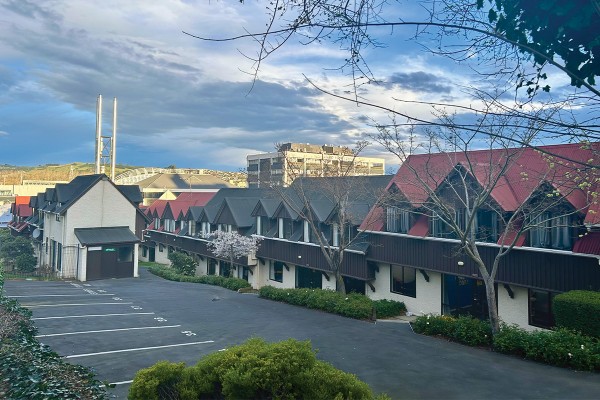UniFlats residents caught off-guard by unanticipated visits from staff and maintenance crew have been left feeling “a bit weird”, to say the least. One Clyde Street resident told Critic Te Ārohi that she was suffering from a severe bout of food poisoning when maintenance staff entered her flat unexpectedly. “I was throwing up at 7am and I just heard a bunch of men downstairs, rustling around,” she said. Over the past few weeks, Critic Te Ārohi has received a myriad of reports just like this one of UniFlats crew letting themselves into flats.
This isn’t the first time the issue has been brought to Critic’s attention. In a 2019 article, Critic reported on complaints of unannounced visits from landlords and Property Services. With stories from current residents carrying the same tune, it seems to be an ongoing issue.
With a regular tenancy, this would be illegal. However, UniFlats sit in a strange grey area – not quite a flat, but not able to be defined as a residential college, either. What this means is that they are not classified under the Residential Tenancies Act which would otherwise require them to provide a minimum of 24-to-48-hour notice to enter the property.
Director of Campus and Collegiate Life Services, James Lindsay, told Critic that UniFlats operates instead as a “collegiate community”. When asked what this meant for residents, exactly, Lindsay explained, “This designation reflects the unique nature of UniFlats, where the prime purpose is to provide suitable accommodation for mostly international students arriving to study here. We provide furnished accommodation, wifi, power, student activities, pastoral care and welfare support services as part of the package.”
When notified of the concerns, Lindsey told Critic, “We understand that unexpected visits can be disruptive and we aim to ensure this does not occur [...] We strive to notify them of any scheduled visits.” But UniFlats residents explained to Critic that “notice” was an extremely loose term for the warnings they’d be given of visitors (if any at all). If residents are given notice, Critic has been told that this usually includes a rough period of time during which they could expect a visit. This period could span up to three weeks, depending on the type of maintenance service. Social anxiety could never.
In what seems like a (sort of) effort to minimise awkward or downright intrusive sitches, Lindsey said, “The Property Services’ team follows a protocol and will always knock and wait for a response before entering a flat. If no-one answers the door, they will call out as they enter a flat.”
Despite encouraging residents to reach out directly with complaints, residents who had done so described the subsequent responses from UniFlats as patchy, defensive, and passive-aggressive at times.
An international student told Critic he’d been left out-of-pocket after his multi-plug was confiscated from his bedroom during an electrical appliance testing visit. He was out of town at the time, and given no notice of the visit. When he reached out to query the confiscation, hoping for at least a refund for the device under warranty, he described emails from UniFlats as “passive-aggressive” and “unhelpful”.
When signing their contract, residents agree to have read the UniFlats’ handbook, which states, “By sending a [maintenance] request you understand and agree for someone to attend your bedroom/area of the building to begin remedying the issue in a timely manner.” It’s no surprise that “a timely manner” may not be interpreted to mean “without specific notice” to residents upon signing. Some residents viewed the visits as an uncomfortable compromise they were forced to make for having better quality housing than their Studentville counterparts in privately-owned historical housing (sporting character-building mould decor). Privacy or insulation? An odd trade-off.
Also according to their handbook, UniFlats “[provides] a safe, clean, comfortable, well-managed and supportive residential environment that fosters a sense of belonging and enhances the University of Otago experience for students and their whānau.” Former UniFlats resident Rebecca* told Critic she had felt anything but. Early morning maintenance drop-ins had left her playing hostess to tradies while still half-asleep in her pyjamas on several occasions.
But it was the expectation being set for residents to always let strangers in, assuming they were staff, that worried Rebecca the most. She feared that the wrong person could easily use this situation to take advantage of vulnerable international students, calling it “an accident waiting to happen”.
Given the mounting concerns, Critic Te Ārohi asked UniFlats if they would look to improve their services to minimise resident discomfort. Lindsay said, “UniFlats is constantly striving to improve our services to our residents and encourage them to share their experiences – good or not so good – directly with us, so that we can reflect on those when managing our service expectations and outcomes.”
*Names changed.



